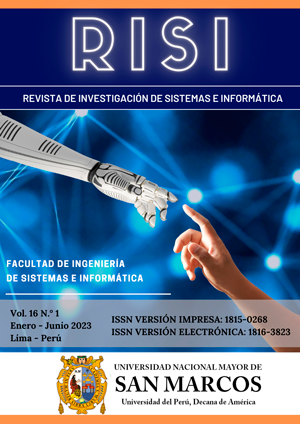Inteligencia artificial aplicado en la detección del discurso de odio en el contexto político social a principios del año 2023 en el Perú
DOI:
https://doi.org/10.15381/risi.v16i1.25061Palabras clave:
Inteligencia artificial, Discurso de odio, Aprendizaje automático, TwitterResumen
La rápida propagación del discurso de odio a través de las redes sociales hacia un gran número de personas ha generado desestabilización en un contexto social y económico al inicio del año 2023. La finalidad de la investigación es detectar el discurso de odio a través de la Inteligencia Artificial con técnicas de Machine Learning en un contexto político social. Además, la investigación es de tipo aplicada en la que se llevó a cabo una búsqueda exploratoria y la población está comprendida por 1.970 tweets en las regiones del centro y sur del Perú. El muestreo es probabilístico, y se revisaron y etiquetaron manualmente 1.970 tweets de las regiones involucradas. Asimismo, la metodología aplicada fue SEMMA, ya que permite asegurar que los modelos sean precisos y se adapten a los datos de este estudio. Se realizó una comparación de los respectivos modelos para lograr un resultado óptimo, de las cuales el indicador principal fue la exactitud promedio en la que el modelo Multinomial Naive Bayes fue el mejor modelo con una puntuación del 73.87%. Finalmente, se concluye que este estudio permite acelerar el proceso de detección del discurso de odio verbal en redes sociales para el análisis de la opinión pública y la detección de presuntos incitadores de odio.
Descargas
Descargas
Publicado
Número
Sección
Licencia
Derechos de autor 2023 Luz Elena Torres Talaverano, Paula Elianne Rojas Villanueva, Lucero Marysol Huamán Ampuero, Ciro Rodriguez Rodriguez, Ivan Carlo Petrlik Azabache

Esta obra está bajo una licencia internacional Creative Commons Atribución 4.0.
LOS AUTORES RETIENEN SUS DERECHOS:
a. Los autores retienen sus derechos de marca y patente, y también sobre cualquier proceso o procedimiento descrito en el artículo.
b. Los autores retienen el derecho de compartir, copiar, distribuir, ejecutar y comunicar públicamente el artículo publicado en la Revista de investigación de Sistemas e Informática (por ejemplo, colocarlo en un repositorio institucional o publicarlo en un libro), con un reconocimiento de su publicación inicial en la Revista de investigación de Sistemas e Informática.
c. Los autores retienen el derecho a hacer una posterior publicación de su trabajo, de utilizar el artículo o cualquier parte de aquel (por ejemplo: una compilación de sus trabajos, notas para conferencias, tesis, o para un libro), siempre que indiquen su publicación inicial en la Revista de investigación de Sistemas e Informática (autores del trabajo, revista, volumen, número y fecha).


